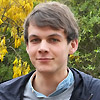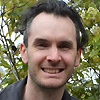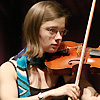Jack Body Interview
This is an edited transcript of the Jack Body interview with Douglas Lilburn. It was recorded and then transcribed by Jack for the 1980 Festschrift celebrating Douglas on his retirement from Victoria University.
If I had a novelist's ear and memory for words I would have ample material to write a biographical sketch of Douglas Lilburn. But I greatly mistrust my ability to reconstruct accurately from memory what is expressed during those fabulous boozy evenings. And so I decided to pay him a visit recently (ca 1980) with a tape recorder in my hand and treachery in my heart. I half expected to be turned away from the door, but Douglas suffered the machine, sitting hawk-like in his chair casting mean suspicious glances sideways at it. Occasionally he would swing over and switch it off, and I would have to wait for the chance to click it on again surreptitiously.
- Jack Body (extract from the 1980 Festschrift)
"I was the youngest child of seven. I arrived five years after a twin brother and sister, so there was quite a gap, and my eldest brother was seventeen years older than me. And when I was about seven years old my parents took my eldest sister with them and they went off on a grand tour as retired people did in those days with enormous trunks which Cooks looked after. My eldest brother had just married. His wife was someone whom I loved dearly - she was like a second mother to me and they were like second parents at that time - almost closer I imagine than my own parents in the sense that we would play tennis and go swimming together and picnic in the bush. But this was at the moment when my twin brother and sister were sent off to boarding school and so in fact I was left a single child in this house which had been full of people before and I kind of rattled around in it on my own apart from my brother and his wife and elderly housekeeper...
The farm was Drysdale Station which was at Pukeroa which is eighteen miles out of Hunterville on the upper reaches of the Turakina River, way back in the bush - a beautiful place, beautiful, beautiful, yes. I mean I just had this paradise to roam around in and there were some neighbourhood kids that I could play with. But there was a slight barrier there because they were the children of people who were working on the Station and always at a certain point they went back to the small houses and I went back to the big house. When my parents came back they moved into Wanganui to retire and they took me with them and I went to school there. But on holidays of course I always went straight back to one of the farms...
You know when you talk about the loneliness of childhood that I had at that particular time when my parents went off to England and my brothers and sisters disappeared... I remember the first time my brother and sister came back, and we played together again. The big dining-room table was made into a house with rugs hung over it, something like that, and we all got inside. This was fabulous. But then of course they went off and I was wandering round again, and tried to do it on my own. But I finished up in tears I think, with the realisation that one is alone, and that one can't repeat things like that. A very searing kind of experience in a sense. It's not a very big house now, but it was a very big house to me as a child.
You ask for significant times and places - but James Joyce tried to do it you know over one day. It's not possible. It needs an extraordinary art to know what to throw out. Even your admired Genet says this: "The problem of writing is not what you put in but what you throw out". That's absolutely true. I've got something to show you. James Murray, [the compiler of the] the Oxford English Dictionary: "It is one of the hateful characteristics of a degenerate age that the idle world will not let the worker alone, accept his offering of work, and appraise it for itself, but must insist on turning him inside out and knowing all about him and really troubling itself a great deal more about his little peculiarities and personal pursuits, than his abiding work. I wish we knew nothing of Carlyle but his writings; I am thankful that we know so little of Chaucer and Shakespeare. I have persistently refused the whole buzzing swarm of biographers saying simply, "I am nobody. If you have anything to say about the dictionary, there it is at your will. But treat me as a solar myth, or an echo or an irrational quantity, or ignore me altogether." I read that this morning, anticipating you... It's a pruned tree which bears fruit, not the tree that grows luxuriously. That's an old saying. And the person who produces work is not necessarily an interesting person.
For me, teaching became easier when I finally began to realise that there was no real barrier between me and the people I was talking to, that I was talking to them as though I was arguing with myself, almost that we were a part of one thing. To try to involve them so that it becomes a two-way process essentially. I'm rather pleased when one of my students says to me this year, "You know you didn't hand us a line. You asked us to think." ... Because there is not one truth, there are many truths, particularly about music. Everybody's ears are on different and nobody translates the messages which come through the ears in quite the same way and so one simply cannot - what's the word? Can't think of it now. Turn off that bloody machine.









